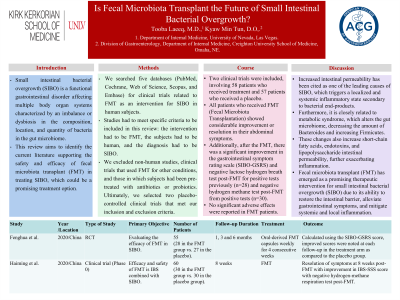Monday Poster Session
Category: Colon
P1919 - Is Fecal Microbiota Transplant the Future of Small Intestinal Bacterial Overgrowth?
Monday, October 28, 2024
10:30 AM - 4:00 PM ET
Location: Exhibit Hall E

Has Audio
- TL
Tooba Laeeq, MD
University of Nevada
Las Vegas, NV
Presenting Author(s)
Tooba Laeeq, MD1, Kyaw Min Tun, DO2
1University of Nevada, Las Vegas, NV; 2Creighton University School of Medicine, Las Vegas, NV
Introduction: Small intestinal bacterial overgrowth (SIBO) is a functional gastrointestinal disorder affecting multiple body organ systems characterized by an imbalance or dysbiosis in the composition, location, and quantity of bacteria in the gut microbiome. This review aims to identify the current literature supporting the safety and efficacy of fecal microbiota transplant (FMT) in treating SIBO, which could be a promising treatment option.
Methods: Five databases (PubMed, Cochrane, Web of Science, Scopus, and Embase) for clinical trials related to FMT as an intervention for SIBO in human subjects were searched. To be included in this review, studies had to meet specific criteria: the intervention had to be FMT, the subjects had to be human, and the diagnosis had to be SIBO. We excluded non-human studies, clinical trials that used FMT for other conditions, and those in which subjects had been pre-treated with antibiotics or probiotics. Ultimately, we selected two placebo-controlled clinical trials that met our inclusion and exclusion criteria.
Results: Two clinical trials were included involving 58 patients who were given treatment and 57 patients who were given a placebo. All patients who received FMT (Fecal Microbiota Transplantation) showed considerable improvement or resolution in their abdominal symptoms. Additionally, after the FMT, there was a significant improvement in the gastrointestinal symptom rating scale (SIBO-GSRS) and negative lactose hydrogen breath test post-FMT for positive tests previously (n=28) and negative hydrogen methane test post-FMT from positive tests (n=30). No significant adverse effects were reported in FMT patients.
Discussion: Increased intestinal permeability has been cited as one of the leading causes of SIBO, which triggers a localized and systemic inflammatory state secondary to bacterial end-products. Furthermore, it is closely related to metabolic syndrome altering the gut microbiome, decreasing the amounts of Bacteroides and increasing Firmicutes. These changes also increase short-chain fatty acids, endotoxins and lipopolysaccharide intestinal permeability, further exacerbating inflammation. Fecal microbiota transplant (FMT) has emerged as a promising therapeutic intervention for small intestinal bacterial overgrowth (SIBO) due to its ability to restore the intestinal barrier, alleviate gastrointestinal symptoms, and mitigate systemic and local inflammation.
Note: The table for this abstract can be viewed in the ePoster Gallery section of the ACG 2024 ePoster Site or in The American Journal of Gastroenterology's abstract supplement issue, both of which will be available starting October 27, 2024.
Disclosures:
Tooba Laeeq, MD1, Kyaw Min Tun, DO2. P1919 - Is Fecal Microbiota Transplant the Future of Small Intestinal Bacterial Overgrowth?, ACG 2024 Annual Scientific Meeting Abstracts. Philadelphia, PA: American College of Gastroenterology.
1University of Nevada, Las Vegas, NV; 2Creighton University School of Medicine, Las Vegas, NV
Introduction: Small intestinal bacterial overgrowth (SIBO) is a functional gastrointestinal disorder affecting multiple body organ systems characterized by an imbalance or dysbiosis in the composition, location, and quantity of bacteria in the gut microbiome. This review aims to identify the current literature supporting the safety and efficacy of fecal microbiota transplant (FMT) in treating SIBO, which could be a promising treatment option.
Methods: Five databases (PubMed, Cochrane, Web of Science, Scopus, and Embase) for clinical trials related to FMT as an intervention for SIBO in human subjects were searched. To be included in this review, studies had to meet specific criteria: the intervention had to be FMT, the subjects had to be human, and the diagnosis had to be SIBO. We excluded non-human studies, clinical trials that used FMT for other conditions, and those in which subjects had been pre-treated with antibiotics or probiotics. Ultimately, we selected two placebo-controlled clinical trials that met our inclusion and exclusion criteria.
Results: Two clinical trials were included involving 58 patients who were given treatment and 57 patients who were given a placebo. All patients who received FMT (Fecal Microbiota Transplantation) showed considerable improvement or resolution in their abdominal symptoms. Additionally, after the FMT, there was a significant improvement in the gastrointestinal symptom rating scale (SIBO-GSRS) and negative lactose hydrogen breath test post-FMT for positive tests previously (n=28) and negative hydrogen methane test post-FMT from positive tests (n=30). No significant adverse effects were reported in FMT patients.
Discussion: Increased intestinal permeability has been cited as one of the leading causes of SIBO, which triggers a localized and systemic inflammatory state secondary to bacterial end-products. Furthermore, it is closely related to metabolic syndrome altering the gut microbiome, decreasing the amounts of Bacteroides and increasing Firmicutes. These changes also increase short-chain fatty acids, endotoxins and lipopolysaccharide intestinal permeability, further exacerbating inflammation. Fecal microbiota transplant (FMT) has emerged as a promising therapeutic intervention for small intestinal bacterial overgrowth (SIBO) due to its ability to restore the intestinal barrier, alleviate gastrointestinal symptoms, and mitigate systemic and local inflammation.
Note: The table for this abstract can be viewed in the ePoster Gallery section of the ACG 2024 ePoster Site or in The American Journal of Gastroenterology's abstract supplement issue, both of which will be available starting October 27, 2024.
Disclosures:
Tooba Laeeq indicated no relevant financial relationships.
Kyaw Min Tun indicated no relevant financial relationships.
Tooba Laeeq, MD1, Kyaw Min Tun, DO2. P1919 - Is Fecal Microbiota Transplant the Future of Small Intestinal Bacterial Overgrowth?, ACG 2024 Annual Scientific Meeting Abstracts. Philadelphia, PA: American College of Gastroenterology.
